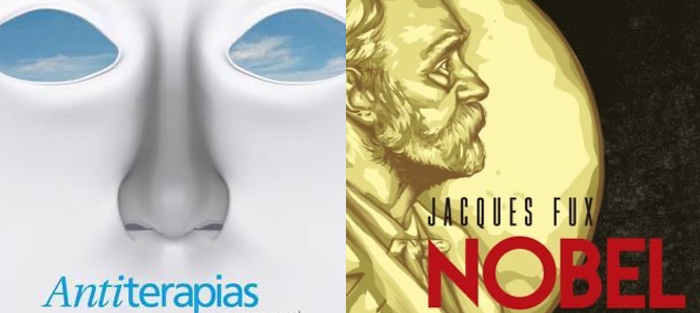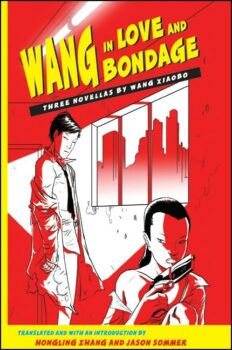Early in the pandemic, I stumble upon two stories by Brazilian author Jacques Fux: “I am What I Can’t Remember” (Asymptote) and “Bobby Fischer’s Greatest Moves” (Tablet). I’m drawn to the author’s versatility, command, menacing intelligence, and his style in giving himself to Jewish literature. Yet since most of his writing hasn’t been translated into English, despite numerous accolades, I decide to reach out to Fux. I want to know more about his eclectic body of work.
We maintain a correspondence for a few months, sharing thoughts on a wide range of topics—from our mutual admiration of Kafka and Lispector, to films, and even to basketball. He sends me a translated excerpt of Antiterapias (Antitherapies), which won the 2013 São Paulo Prize in Literature. I’m taken by his ability to shape complex themes into a story that pulses with yearning and life.
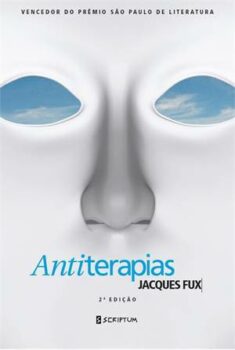 He reads some of my work. We arrange to meet. He’s in Belo Horizonte, Brazil. I’m in New York City. Hence, Zoom is the sensible solution. We begin our discussion, like so many discussions now, with the pandemic: vaccines; vaccination rates; quarantine requirements or lack thereof; the widespread normalization of death; and all that has become surreal. This leads to numbers, where mathematics exists and doesn’t exist, and then the relationship between mathematics and literature. He introduces me to Perec’s constraints and his book, Literatura e Matemática: Jorge Luis Borges, Georges Perec e o OULIPO. I’m fascinated by the way Fux details how mathematical concepts can be applied to literature. That they don’t need to repel each other and can coexist in the same space.
He reads some of my work. We arrange to meet. He’s in Belo Horizonte, Brazil. I’m in New York City. Hence, Zoom is the sensible solution. We begin our discussion, like so many discussions now, with the pandemic: vaccines; vaccination rates; quarantine requirements or lack thereof; the widespread normalization of death; and all that has become surreal. This leads to numbers, where mathematics exists and doesn’t exist, and then the relationship between mathematics and literature. He introduces me to Perec’s constraints and his book, Literatura e Matemática: Jorge Luis Borges, Georges Perec e o OULIPO. I’m fascinated by the way Fux details how mathematical concepts can be applied to literature. That they don’t need to repel each other and can coexist in the same space.
With each read of Fux’s Antiterapias excerpt there’s something new and compelling to detect, especially in considering his deliberate use of literary references. At some point, I confess to Fux that I have, until now, resisted using them for fear that my writing might be interpreted as cliché or pretentious, to which he says, “I use literary references to show the many connections to past writers, to the infinity of literature. Once you’re inside a single book, you’re inside a library and a universe.” In other words, for Fux, to write is not only to write, but to re-read and resurrect literature.
In one chapter from Antiterapias, a young Jewish man searches for a place in the contemporary Brazilian ghettos while coming-of-age with an older brother who has been diagnosed with Cerebral Palsy. The work is rich, exotic and layered with humor, pain, tenderness, longing, and, of course, an abundance of literary references—from Judaism to the Bible, Cabal, Einstein, Don Quixote, Phillip Roth, and others. Fux writes in the first-person narrative:
My own story began to replicate literature. I discovered inside myself the symptoms of Portnoy’s Complaint. Fascinating. The way history had reproduced history was already quite staggering; that my story could reproduce literature was inconceivable. Yet, all the same, my story went on.
In a few lines, Fux’s reference to Philip Roth’s Portnoy’s Complaint sets in motion the many dimensions and connections between character, novel, literature, history, and the narrator, thereby placing the piece into the expanse of an “inconceivable” literary universe. Even if a reader hasn’t read Portnoy’s Complaint, they can relate to a character longing to connect their experience to the experience of others, whether literal or fictive. Moreover, the reference orients the reader into how the first-person point of view perceives and interprets their story, providing an accessible window into the many layers of the protagonist’s character.
For Fux, references become signposts through which the uncertainty of a narrative can be navigated, inviting the reader to unravel and question the significance of scenes at the same time as the protagonist rather than becoming a passive recipient who responds only to what happens on the page. In a way the reader becomes something of a willing collaborator with Fux, managing the threads and pathways that connect life and literature to history and the universe of literature. What’s more, in Fux’s Antitherapies, literary references are embedded in the design. The novel is structured such that each chapter re-reads a different important work. In our most recent conversation, Fux says about his structure:
“In one chapter I give my hands to Portnoy’s Complaint and Roth. Another is about stream-of-consciousness and re-reading James Joyce. One is about the Divine Comedy, where the narrator condemns people to Hell. Another relates to Tristan and Iseult. When the protagonist discovers love and memory, Proust is referenced.”
It is as if Fux, in arranging this novel that depends on literary references, resists the illusion of thematic certainty and continuity, where there is a single progression replete with obvious causal connections, whereby a novel and its significance is confined only to its pages, chapters, characters, and turns of phrase. Every component of Antitherapies is relative and boundless. It asks nothing more than to be entwined in the expanding literary universe. The use of literary references to question character and story can allow for a piece to associate itself with other narratives, becoming a pathway and possibility without ascribing irrefutable meanings to the narrative.
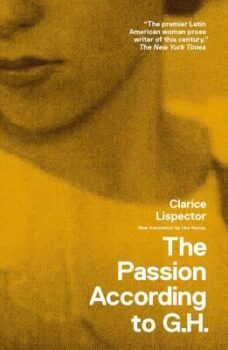 Perhaps the capacity for pieces to elude meanings while evoking important questions and connections also indicates that to search for a meaning, to suggest a new meaning unfolds in a single novel, can be a limiting burden. Clarice Lispector senses something like this in The Passion According to G.H. when she writes, “I’m afraid to start to ‘make’ a meaning, with the same tame madness that till yesterday was my healthy way of fitting into a system.” When Fux uses literary references, he deploys them in that essential way, where an irreducible meaning is not “made” and imposed on the reader. Rather, the references are a device to resist singularities in meaning and shape.
Perhaps the capacity for pieces to elude meanings while evoking important questions and connections also indicates that to search for a meaning, to suggest a new meaning unfolds in a single novel, can be a limiting burden. Clarice Lispector senses something like this in The Passion According to G.H. when she writes, “I’m afraid to start to ‘make’ a meaning, with the same tame madness that till yesterday was my healthy way of fitting into a system.” When Fux uses literary references, he deploys them in that essential way, where an irreducible meaning is not “made” and imposed on the reader. Rather, the references are a device to resist singularities in meaning and shape.
Needless to say, literary references alone can’t be enough. A compelling narrative demands that they are deployed sensibly, adhere to the conventions of the piece, and sustain the needed momentum to stimulate readers without disrupting the rhythms and textures of the lines, passages, and chapters. In a later passage in Antitherapies, Fux demonstrates his ability to ground references in a scene without jeopardizing an engaging, well-paced narrative:
And so, still a cub, I made the most important decision of my life. Which almost never changed with the passing of the years. A practical decision, straight to the point and easily within reach: I would become an astrophysicist and before long would earn a Nobel Prize. Obviously it wouldn’t do to simply study the most complex mathematical theories applied to the most wild, abstract, and imaginative concepts of physics. All of those things led to minor awards. Who needs a Jabuti, a Pulitzer, or any of that other crap? The Nobel it would be […] Several times, I rehearsed my Nobel acceptance speech. My thank-you remarks. My dedication. My humility in the face of such a feat. Everything was set. Only the details remained to be worked out. Hence, in my view, my story and that of my family bore resemblance to stories from literature and Jewish history. I needed to be brilliant, like Alexander Portnoy. My brother, on the other hand, like Portnoy’s sister, was far from a genius. But he had many qualities. A man of plain qualities and remarkable sensitivity. In this way, my life and my family, though special, weren’t unique. Other lives and other literatures had invariably been like mine. Could that be why I’m here talking about and fabricating my life and my literature? Am I special or not? Have we all been chosen? Do we choose our own paths? Je m’en fous.
Fux’s choice to include “Other lives and other literatures had invariably been like mine” situates this work into a perspective that’s non-specific and relatable, eluding the convenient tendency for many writers to avoid references in pursuit of that which is unique and therefore meaningful. Literary references enable this piece to ask vital and common questions such as “Am I special or not?” and “Do we choose our own paths?” Even though the protagonist is not subject to an impossibly debilitating circumstance that might be the fuel for a narrative defined by action, conflict, suspense, and undeniable change in character and meaning-riddled resolutions, he is aware of his lack of inherent distinctive qualities and transforms this lack into a motivating device. Moreover, literary references become necessary road signs for the character and the reader to navigate and find familiarity in the journey.
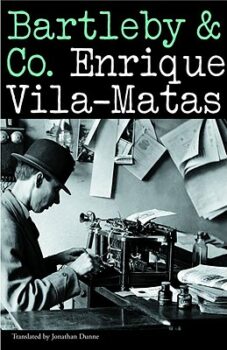 Enrique Vila-Matas’s novel Bartleby & Co. is an avalanche of literary references that follows a hermetic hunchback in the search of other “Artists of the No” who choose not to write like the scrivener Bartleby of the Herman Melville story. The piece gleans from chapter to chapter, unearthing ways in which notable writers have decided “not” to write. The premise is a reference and demands references to satisfy its insatiable hunger. The novel reads like a collection of engaging, philosophical footnotes that questions why writers write and where writing exists when a writer doesn’t write.
Enrique Vila-Matas’s novel Bartleby & Co. is an avalanche of literary references that follows a hermetic hunchback in the search of other “Artists of the No” who choose not to write like the scrivener Bartleby of the Herman Melville story. The piece gleans from chapter to chapter, unearthing ways in which notable writers have decided “not” to write. The premise is a reference and demands references to satisfy its insatiable hunger. The novel reads like a collection of engaging, philosophical footnotes that questions why writers write and where writing exists when a writer doesn’t write.
Where Fux’s Antitherapies reveals how literary references can effectively function like signposts that guide rather than affirm, in Bartleby & Co. Matas aims each of the literary references at a single, specific target which is to find other “Artists of the No.” Still, to avoid producing a novel that reads like an elaborate romp of pure literary criticism and not an engaging narrative, Matas interrupts lengthy meditations on other writers by grounding scenes in a physical space with sensory details, rendering the presence of the protagonist concrete and tangible. For instance, after filling a chapter with thoughts on Joseph Joubert, who “never wrote a book” and “only prepared himself to write one, single-mindedly searching for the right conditions,” Matas begins the following chapter by realizing that ninety-nine percent of the population choose not to write before he grounds the scene:
After thinking about these clear examples of artists of the No, I observed that I was still somewhat jittery and agitated. I said to myself that it would do me good to get out a bit, not to limit myself to greeting the porter, to discussing the weather with the newspaper man or to responding with a laconic no in the supermarket when the checkout girl asks me whether I have a member card.
Whether it is the inclusion of “jittery and agitated,” or the decision to get out a bit, discuss the weather with the newspaper man, and responding to the checkout girl with a “laconic no,” these mundane details are essential in that they’re accessible and balance the cascade of thoughts set in motion by literary references. Again, without these vital elements, the novel might be perceived as only literary criticism. It might suffer an implacable lack, preventing it from plunging into literary infinity. That’s why Matas displays his skill at balancing literary references with just enough mundane, grounding details to allow the piece to raise questions about what writing and not writing implies. Then, soon after this passage, Matas eases the narrative back into literary references:
I woke up very early and, while I was preparing breakfast, I was thinking about all the people who do not write […] I began to imitate the gestures Kafka would sometimes use: clapping, rubbing my hands together, shrugging my shoulders, lying on the ground, jumping, preparing to throw or catch something.
Thinking of Kafka reminded me of the Hunger Artist in one of his stories…
This shows how Matas never deviates too far from literary references, yet gives the reader just enough sensory detail and a grounded scene to keep the construction from becoming submerged in an ocean of references. The references are fully in his command. That’s why Matas can even get away with writing references within references:
The denial of art led him to even more extreme denials, including that “final denial” referred to by Camus, who, commenting on why Chamfort did not write a novel and fell into an extended silence, has this to say: “Art is the opposite of silence,” […]
As we can see, Camus – a yes-artist if there ever was one in his firm belief that art is the opposite of silence – would have been somewhat paralyzed had he known the work, for example, of Beckett and other consummate, recent disciples of Bartleby.
Where Jacques Fux uses references like signposts to help guide, contextualize, and connect to the experiences of other characters in literature throughout history, Matas allows references to spill over into each other like a flowing current while preserving the central philosophical purpose of searching for writers who have deliberately chosen not to write. Both of their styles, though distinct, share a longing to find something in literary references that demystifies questions that are central to their overarching narrative.
In Saul Bellow’s novel Humboldt’s Gift, literary references are used to build character. They become something like appraisals or measurements rather than signposts or devices that triggers an avalanche of references leaking into myriad references. Instead of being entwined with the structure, as in Fux’s and Matas’s novels, they maintain a certain distance from the shape of grounded scenes. But they still enrich the narrative without interfering with plot and theme. Early in Humboldt’s Gift, when the character Von Humboldt Fleisher, an eccentric and brilliant poet, is described, Bellow reveals his distinctive style in deploying literary references:
Humboldt easily went in his conversation from Babe Ruth to Rosa Luxemburg, and Béla Kun and Lenin. Then and there I realized that if I didn’t read Trotsky at once I wouldn’t be worth conversing with. Humboldt talked to me about Zinoviev, Kamenev, Bukharin, the Smolny Institute, the Shakhty engineers, the Moscow trials, Sidney Hook’s From Hegel to Marx, Lenin’s State and Revolution. In fact, he compared himself to Lenin. “I know,” he said, “how Lenin felt in October when he exclaimed, ‘Es schwindelt!’ He didn’t mean that he was schwindling everyone but that he felt giddy. Lenin, tough as he was, was like a young girl waltzing. Me too. I have vertigo from success, Charlie…”
Notice how these references implicitly contain a predetermined meaning or world, if you will, and are somewhat separated from the scene. In other words, they are formed and appropriated in service of Humboldt’s character. Humboldt ascribes purpose and relevance to them. This opposes Fux’s use of literary reference as a suggestion, a possibility, and an opening into the literary universe. However, we accept Bellow’s references for their contribution to the distinctive enormity of Humboldt’s character. Without these references readers may not be able to gauge the magnitude of Humboldt. Hence, they become evidence of knowledge that differentiates characters. In this way the references are contained within the characters while the unfolding of narrative action and all the motivating tensions therein are predominantly distinct from the references. Although the references can at times feel like lists, Bellow’s use of Lenin and Humboldt comparing himself to Lenin in dialogue captures the personality of, and the dynamic between, Humboldt and Charlie, which is contained in, “Then and there I realized that if I didn’t read Trotsky at once I wouldn’t be worth conversing with.” This passage shows how references can become necessary for establishing fully realized characters. Although Bellow’s references aren’t as structurally complex as Fux, and don’t spill over and agitate reference after reference as in Matas’s novel, they can still become necessary for forming unforgettable characters that shape unforgettable stories.
Fux, Matas, and Bellow transform literary references into devices that layer and enrich engaging novels and characters. To dig into their work moves me closer to the many dimensions of writing and creating, reminding me of Trinh T. Min-ha’s insight into the act of writing in Woman, Native, Other:
Neither entirely personal nor purely historical, a mode of writing is in itself a function. An act of historical solidarity, it denotes, in addition to the writer’s personal standpoint and intention, a relationship between creation and society. Dealing exclusively with either one of these two aspects, therefore, proves vain as an approach. So does preaching of a revolution through a writing more concerned with imposing than raising consciousness regarding the process by which language works regarding the nature, activity, and status of writing itself.
Writing should be a movement. It should be a possibility and a means to question and confront the entanglements of history, perception, and the experiences of individuals faced against the world and its made systems. Literary references can resist the confines of singularity and orient readers without imposing irreducible truths that can debilitate and suppress. As Fux suggested, they can become a means by which we access the infinity of literature. If literature exists, it must be somewhere that realizes infinity.

